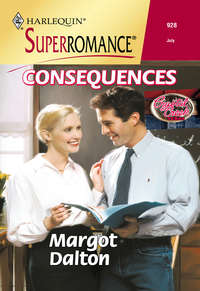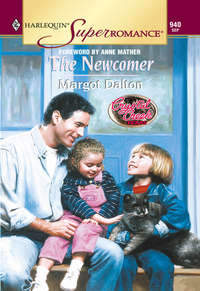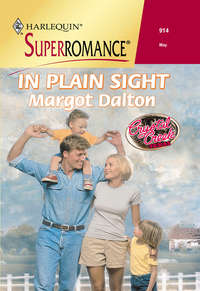
Полная версия
A Family Likeness
“Thanks,” Gina told her. “That was thoughtful of you, Mary.”
“How about me?” Roger asked. “Did you get any books for me?”
“Two political biographies and a new mystery,” Mary replied calmly. “Although I probably needn’t have bothered, since you seem to be so busy these days.”
The words were innocent enough, but Gina was surprised by the unusual edge in Mary’s voice and the way Roger seemed to duck his head in embarrassment.
Suddenly the room was full of tense undercurrents. Confused, Gina looked from one to the other, about to ask what was going on, when Mary resumed her story.
“And while I was browsing through the newspapers, I discovered the most amazing thing.”
“An appropriate location to make amazing discoveries,” Roger murmured, his equilibrium apparently restored. “Among the well-stocked shelves of the Azure Bay Library.”
Mary ignored him and addressed Gina. “Remember the day you brought that man into the kitchen and introduced him to me? The one who’s staying all summer with his daughter?”
Gina nodded. “Alex Colton. He’s arriving in a few days.”
“And remember how I told you after he left…” Mary paused to add more milk to her batter. “I told you I was absolutely positive I’d seen him somewhere, and you said I was probably wrong because he’d never been in the valley before?”
Gina nodded, baffled. “I remember. Why?”
“Well, I was right,” Mary said, crossing the kitchen to rummage through the pile of books and magazines.
Gina got up again and crossed to the big central table, cradling her coffee mug in her hands and sitting down next to Roger.
Mary opened a recent copy of a newspaper and laid it out on the table in front of them. “See?” She stood back with an air of triumph.
Gina gazed in astonishment. Alex Colton’s picture appeared at the top of a newspaper column on the financial pages. She studied the image, struck once again by the man’s appealing masculine look, and the contradictory mixture of sensuality and asceticism in his face.
“I’ll be damned!” Roger exclaimed. “Alex Colton is a columnist? I thought he was a college professor.”
“Not just any columnist. He’s Alexander Waring.” The usually reserved Mary clearly enjoyed the sensation she was causing. “He writes this column about investment and personal finance,” she told Gina. “It’s syndicated, and Roger and I read it all the time. His column’s in a lot of the big papers, but it never used to have his picture at the top. He also has four or five books in the library.”
Roger leaned closer to examine the paper. “Well, I’ll be damned,” he repeated. “Alexander Waring. I have two of his books at home, you know. He has terrific money sense.” Roger shook his head in amazement. “And to think I talked with the man about woodwork and cello music, and didn’t even know who he was.”
“Well, I don’t know as much about the world of high finance as you two obviously do.” Gina took the paper from Roger and studied the picture. “Is he really good?”
“He’s one of the best,” Roger said. “His books give down-to-earth advice on investing and money management, things an ordinary person can actually use. And sometimes,” he added with a smile, “they’re really funny. The man must have a great sense of humor.”
“Can I borrow one of them?” Gina asked. “It’s probably…it’s time for me to start learning something about money management,” she said lamely when the other two looked at her in surprise.
Roger’s eyes were bright with teasing. “That’s all you want to learn?”
“Of course,” Gina said. “You know, I just remembered—he did say that he planned to do some writing this summer. He asked me about electrical outlets on the gold-room balcony for his computer.”
“I suppose he has to keep writing even during the holidays,” Mary said. “He could hardly take two whole months off, after all. A lot of people swear by that column of his.”
“Really? You think he’ll still be doing the column?” Gina asked with sudden excitement. “Maybe he’ll mention the hotel. Anything that brings us to the attention of the public is good for business.”
“As long as he writes about how good the food is,” Mary observed placidly.
“And doesn’t devote whole columns to disruptive pets.” Roger glanced at Annabel, who’d emptied her dish and was now clattering it noisily around on the floor in a vain attempt to discover stray morsels clinging to the sides or bottom.
Mary glared at him. “Most people,” she said coldly, “have better things to do with their time than sit around insulting poor defenseless animals.”
“Ah, yes. My cue to depart.”
Roger got to his feet, smiled at the two women and strolled from the room. They could hear the sound of a truck starting outside, followed by the slow rumble of his departure along the lakeshore road.
“He isn’t going home,” Gina said, leaning forward to peer out the window. “He must be going into town.”
She seated herself at the worktable again, setting the newspaper down carefully next to her tackle box. Mary continued to work at the central table, mixing batter in the bowl with fierce strokes.
“Mary?” Gina said.
“What?”
Mary bent down to take Annabel’s feeding dish away. The poodle sank onto her fat haunches and watched with a comical look of dismay.
“Did you notice something different about Roger tonight?”
“Of course I did,” Mary said curtly.
“What is it?”
“He’s all dressed up. He’s wearing his second-best pants, those gray pleated corduroys, and the new sweater I gave him for Christmas.”
Gina’s eyes widened. “You’re right,” she said, putting down her pliers. “I remember when he got that sweater, but I don’t think I’ve ever seen him wearing it before.”
Mary murmured something to the poodle, then returned to her task.
“Why would he be all dressed up?” Gina said, puzzled. “This is just an ordinary Saturday night, isn’t it? I mean, their chamber group isn’t playing anywhere. He always tells me when they have a concert in case I want to go along.”
“Oh, it’s certainly not a concert,” Mary said.
Gina pushed her chair back, completely intrigued by now. “Mary, I want you to tell me what’s going on.”
“Nothing very important. Roger has a lady friend, that’s all.”
“You’re kidding.” Gina gaped at the cook, astounded, while Mary continued to whip the batter. “How could Roger possibly have a girlfriend without me knowing?”
Mary remained silent and tipped the contents of the blue bowl into a pitcher, then stored it away in one of the two oversize fridges along the wall.
“Look,” Gina persisted, “are you serious? I mean, about Roger having a lady friend?”
Mary poured herself a mug of coffee and sat wearily at the table. “Oh, yes,” she said. “I’m quite serious.”
“I can’t imagine,” Gina said, “who the woman could be. I don’t think there’s anybody in town who’d be even faintly eligible. Although—” she frowned thoughtfully “—when one considers Cecil Bedlow and Marianna Turner, I guess anything’s possible.”
“It’s not somebody from town,” Mary said, bending to stroke Annabel. “It’s a stranger. A woman who’s staying at Fred’s motel out near the winery.”
“How did Roger meet her?”
“Apparently she came to one of their chamber concerts and struck up a conversation with him. Roger’s taken her out several times since then for drives and coffee.”
“Why,” Gina said plaintively, “does nobody ever tell me anything?”
Mary shrugged. “I thought it was no big deal at first. Apparently this woman is one of the shareholders in the winery, and she wanted to come out and look at her investment firsthand. At least, that’s what Fred says.”
“Well, Fred should know. He runs the motel, after all.”
“Fred’s not all that bright,” Mary said sadly. “Even if he is my second cousin.”
“So how long has this woman been staying at the motel?”
“About two weeks.”
“Have you met her, Mary?”
“Annabel, stop that whining!” the housekeeper warned with unusual sharpness. “Stop it this instant!”
The poodle slunk away into the hallway, casting a bitter glance over her shoulder as she did so.
“Mary?” Gina prodded.
“Yes,” the housekeeper said, rubbing the back of her neck with a weary sigh. “I’ve met her, all right. She was in the drugstore yesterday, and Maybelle introduced us. I knew the woman was interested in Roger, so I took a real good look at her.”
“What’s her name?”
“Lacey Franks.”
“And how old is she?” Gina asked.
“Probably about fifty, but she looks ten years younger than she is. Dyed hair,” Mary said. “Bright clothes and lots of makeup, but she’s careful with it so you can’t tell.”
Gina wound another fishing fly onto her vise, gripping the pliers in silence.
“She’s very stylish.” Mary looked down ruefully at her cotton dress and brown cardigan. “And she dresses to show off her figure, too. Yesterday when Maybelle introduced us, she was wearing a little yellow tennis dress with a sweater tied over her shoulders like the women in the television ads.”
Gina shook her head in amazement. “And our Roger is interested in her? He’s actually taken her out on a date?”
“More than once,” Mary said darkly. “Maybelle told me she saw them sitting in a booth at the Clamshell eating lobster, holding hands and laughing together like teenagers.”
“Well, for goodness’ sake,” Gina said, pleased by this image. “Isn’t that nice.”
Mary folded a plastic covering over one of the mixing bowls.
“Where does this Lacey Franks live?” Gina asked. “Does the local gossip network know anything about her?”
“Only that she’s supposed to be rich and her home address is somewhere in West Vancouver.”
“That’s a pretty posh area, isn’t it?”
“I wouldn’t know,” Mary said. “I really wouldn’t know.”
The cook got up, removed her apron and hung it in the pantry. With a softly worded good-night, she made her way out of the kitchen, leaving Gina sitting alone at the window, gazing thoughtfully out at the darkness.
ALEX COLTON, TOO, was gazing into the darkness through the window in his study. The sun had vanished below the horizon in a fiery ball of orange, and the light across the waters of English Bay had faded quickly.
At last he got up and prowled restlessly around the little room, picking up papers and setting them down again, scanning the shelves for a book to take up to his room later. But nothing looked interesting.
“Lord, how I need a holiday,” he muttered, returning to the window. “Or at least a change of scene.”
He thought about the vine-covered mansion in the Okanagan, and the newly papered room where he would soon be staying. The place was enormously appealing, especially with that air of bygone elegance that so perfectly suited the peaceful drowsy warmth of its rural setting.
It was odd, Alex mused, that Janice had never mentioned the hotel to him. She’d obviously learned about it years ago and set aside that brochure in anticipation of a time when they could travel there on a family vacation.
But for the past two years, Jan hadn’t been well enough to travel anywhere. And in the final months of her life, she often hadn’t even been able to remember her husband’s name or their daughter’s face, let alone the address of a resort hotel.
Alex gazed blindly out the window at the dark silvered water, trying to fight off the image of Janice’s twisted face, her body ravaged by an illness so brutal that in the end, it destroyed every vestige of dignity and composure. With a little shock of alarm, he realized he could no longer remember her as she’d looked before the illness. He picked up a photograph from his desk and studied the smiling image in the gold frame.
Jan had been slim and blond, with a delicate, almost angelic beauty that belied her determined nature. When they were first married all those years ago, he’d been surprised and a little taken aback to learn just how formidable—and stubborn—a woman she really was.
But even Jan’s strength had been no match for the crippling illness that was hidden in her body, biding its time, waiting to claim her.
He shook his head moodily, still watching as the last of the twilight glow faded beyond the horizon and the first stars began to glimmer over the waters of the bay. He found his mind returning to the old hotel on the lake and the young woman who apparently owned it. She’d been in his thoughts a lot these days, more than he liked to admit.
Slowly Alex sank into an armchair by the window and allowed himself to reconstruct the image of Gina Mitchell’s face. Everything about the woman was appealing. He liked the open frankness of her expression, the level brows and calm hazel eyes, her dusting of freckles and that cropped curly mass of dark hair. He even admired the boyish athletic look of her body.
He smiled, recalling the way she’d emptied her pockets and solemnly lined up those delightful little objects along the top of the stone wall. At that moment he’d been completely enchanted by her. He would have liked to reach out and touch the skin of her bare arm, ruffle her hair, maybe—
Alex shook his head abruptly, the smile fading.
Not a very attractive line of thought, he told himself, for a man whose wife had been dead for little more than three months.
But Jan had been lost to him for a long, long time. When her symptoms had become too obvious to ignore and she’d finally allowed herself to be examined, the diagnosis itself had been a sentence of death. Both of them knew it. But before death had finally claimed her, the illness had been lingering, so excruciatingly painful both physically and mentally that it had drained every bit of strength from all three of them.
For the last three years, Alex and his wife had no physical relationship apart from the care he gave her and the comfort he could sometimes provide by holding her in his arms. Toward the end, even his touch was too painful for her to endure.
Alex didn’t like to dwell on his own suffering, because he knew that his daughter had endured far more pain. As a girl just entering adolescence, growing into the knowledge of her own womanhood, Steffi had watched her mother fade from strength and beauty to utter dependence. She’d witnessed the deterioration of that lovely body and powerful mind, and gradually come to understand that nobody in her life, not even her father, could protect them from this horror.
He and Steffi had once been so close. Alex was desperately concerned about his daughter’s moody silence and increasing withdrawal. No matter what he did, she seemed to retreat farther from him every day into a place he couldn’t follow.
He put the worried thoughts from his mind and returned to his computer, forcing himself to spend a couple of hours in concentrated work on the final column before his trip to Azure Bay.
At last, when he was too tired to see the computer screen clearly, he got up and pulled the draperies across the darkened window, then went into the kitchen to make coffee and help himself from the bowl of cold pasta salad left in the fridge by his housekeeper. Finally he cleaned up the table and climbed the stairs, stopping outside a closed door in the upper hallway.
“Steffi?” he called softly. “Are you awake?”
No answer. After a moment he pushed the door open and went inside, pausing by his daughter’s bed to look down at her. She was in her long plaid nightshirt and sleeping soundly. Her lips were parted, hands curled under her chin like a small child, and she was bathed in the soft pink glow of a night-light shaped in the form of a rosebud, which had been in her room since she was a baby.
Alex smiled at the delicate cluster of glass petals. Every year or so, Steffi declared that she was old enough to sleep without a light. But after a couple of days the rosebud would reappear, and nobody would comment until her next attempt to leave it behind.
Nowadays he cherished any little habits of childhood that still clung to her. They helped to reassure him that he hadn’t completely lost her. At fourteen his daughter almost had the face and body of a woman. Only when she was sleeping like this could he see traces of the enchanting little girl she’d been.
There were people who’d considered them irresponsible for having a baby when they were aware of Janice’s illness. But those people, of course, didn’t know the truth about Steffi’s birth.
He felt a painful lump in his throat as he remembered how he’d adored that red-haired baby they’d brought home from the hospital all those years ago. What a miracle she’d been to him and his wife. Their lives had been transformed. The growing tensions between him and Janice had almost disappeared, replaced by happy sun-flooded years of laughter and absorption in the growing child they both so dearly loved.
A few years of heaven, Alex thought grimly, followed by years of utter hell. Life had a harsh way of balancing things out.
He could bear it for himself. But he hated his daughter’s having to endure those cruel checks and balances, Steffi, who had never done anything to deserve the kind of suffering inflicted on her family. During all her growing-up years, Steffi had been a pure delight, a ray of sunshine. How he missed that happy generous loving little girl.
Now she was as tall as her mother had been, with a curving figure and a sulky hostile expression that chilled him. Her lips, which were exactly like his own, were usually pressed together in a taut line, and her smiles were rare. He hardly knew what to say to this beautiful stranger, how to fight his way past her anger and pain to the child still living in there.
He reached down gently to brush a strand of hair back from her sleeping face, then adjusted the blankets. As he did so, he saw that Steffi had gone to sleep clutching her old stuffed bunny.
This favorite toy had once been soft pink plush, with a yellow velvet waistcoat and a jaunty expression. But years of love had worn the plush almost bare in places, and the long ears were limp and droopy from constant handling.
As far as he knew, she hadn’t slept with the bunny for eight or nine years. The sight of it now, cradled in her arms, was almost unbearably painful to him.
How lonely and distressed she must be feeling!
If only she would talk to him, even yell at him. Maybe then, Alex and his daughter could start to breach this grim wall of silences and be a family again. But Steffi was so cold and remote. After school and on weekends, she hiked by herself along the trails near their home, fished for hours down in the cove, tramped alone through the woods or sat up in her room with a book.
He should probably be glad she was spending the first two weeks of the summer with Angela Sanders and her parents on a long-planned trip to Disneyland.
As far as Alex knew, his daughter had almost as little to do with her school friends these days as she did with him. Steffi had once been such a bubbly gregarious child, but now she was usually solitary. Maybe a couple of weeks with her friend would be a good thing, though he yearned to have her with him at Edgewood Manor.
But she’d be home from California in a couple of weeks, and then they’d have the rest of the summer together.
Again he thought of the old hotel on the shore of Okanagan Lake. Alex hoped that the tranquillity of that lovely old house and the beauty of its setting would work a miracle, that somewhere within the sun-dappled walls of Edgewood Manor, he would find the touch of magic that would bring his daughter back to him.
CHAPTER FOUR
“WHY DO YOU KEEP looking down the road?”
“What road?” Gina burrowed among the strawberries. “You know, some of these are really huge.” She held up a fat strawberry for Roger’s inspection.
He nodded, leaning on his hoe in the sunshine among the neat little hills of potatoes. “How many roads are there leading to this place?”
“One,” Gina mumbled. “Last time I looked.”
“Which was about four seconds ago.”
Gina sat back on her heels and gave her caretaker a stern glance. “Roger, you’ve got to quit teasing me about that man, or…”
“Or what?”
“Or I’ll wrap a shovel around your neck,” Gina said cheerfully.
Roger rolled his eyes and plied the hoe on a patch of weeds near the fence. “Half the time she worries and frets about me leaving, and the other half she’s threatening to attack me. Women are so hard to understand.”
Gina crawled along the row, digging more plump strawberries out from under their sheltering dark green leaves. “Mary tells me you’ve been learning a whole lot about women these days,” she said casually.
Roger grunted and removed his baseball cap to scratch his head. “And how would Mary know? When she’s not working in that kitchen, she spends all her time at choir practice or buried in the library.”
“Mary knows a lot of things.” Gina stood up and carried her plastic bucket to the next row of strawberries. “Roger…”
“Yes?”
“Why didn’t you tell me about your new friend? You know I’d be interested. I’d love to meet her.”
“What friend?” he asked, scraping busily with his hoe.
“You know.” Gina knelt and started on the next row. “Lacey Franks. The city lady who’s been staying over at Fred’s motel. Apparently the two of you are getting really…well acquainted.”
Roger straightened his lanky body and leaned on the hoe, resting his chin on the handle and staring gloomily across the lake. “This town is the damnedest place for gossip.”
“Of course it is. All small towns are the same way. So?” She looked up at him expectantly.
“So what?”
“Tell me about her,” Gina said, exasperated.
“Nothing to tell. Are any of those wax beans ready yet?”
Gina gave up, knowing it was hopeless to press him further. She reached over to examine a long yellow pod on one of the bean plants nearby.
“Yes, I think they are. A few of them, anyway.”
“Could we pick enough for our supper?”
Gina checked the plants again. “I think so. You’d better tell Mary before she plans something else.”
“You tell her. She hardly speaks to me anymore.”
“Oh, for goodness’ sake,” Gina said. “I get so tired of all the squabbling you two do.”
But her annoyance was immediately overcome by pleasure at the idea of fresh-cooked buttery beans for their evening meal in the kitchen. She was still riffling through the laden bean plants when a shadow fell across the garden.
Roger looked up with a cordial smile.
“Hello there,” he said, leaning on his hoe again to address someone behind Gina. “We’ve been expecting you.”
Gina’s heart began to pound. She got up, holding her plastic pail, and brushed dirt from the knees of her jeans.
Alex Colton smiled and extended his hand. “Hello, Gina. Nice to see you again.”
He looked happier today, Gina thought, examining him closely as she shook his hand. His face was still tired and worn, but he seemed much more relaxed than on his first visit. Today he wore jeans, a yellow cotton shirt and a jaunty straw fedora, and was the image of a man embarking on a long holiday in the country.
“So, Alex, are you ready to settle in and be pampered for a whole summer?” she asked.
“More than ready. I feel like I’ve finally arrived in heaven.” Alex gestured at the lush garden, the stone mansion within its screen of vines and flowers, the shimmering lake and sleepy town in the distance. “I’ve been waiting for this day.”
“So have we,” Roger said with a teasing glance at Gina, who bent hastily to collect her bucket of strawberries.
“I’ll get you registered and show you to your room,” she said. “Unless Mary’s already helped you?”
Alex shook his head. “I just drove up and saw you two out in the garden, so I came right over. What’s in the pail?”
Gina fell into step beside him, heading across the lawn toward the back door. She held out the pail so he could see. “Mary’s planning to make strawberry waffles for breakfast tomorrow.”









